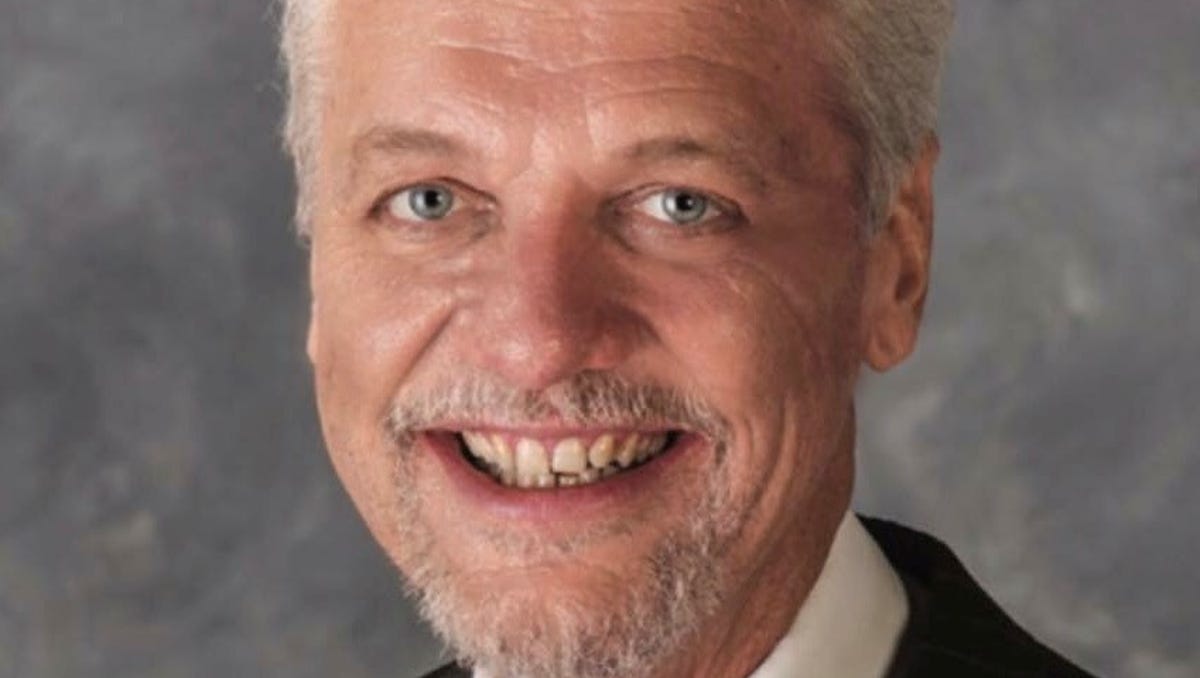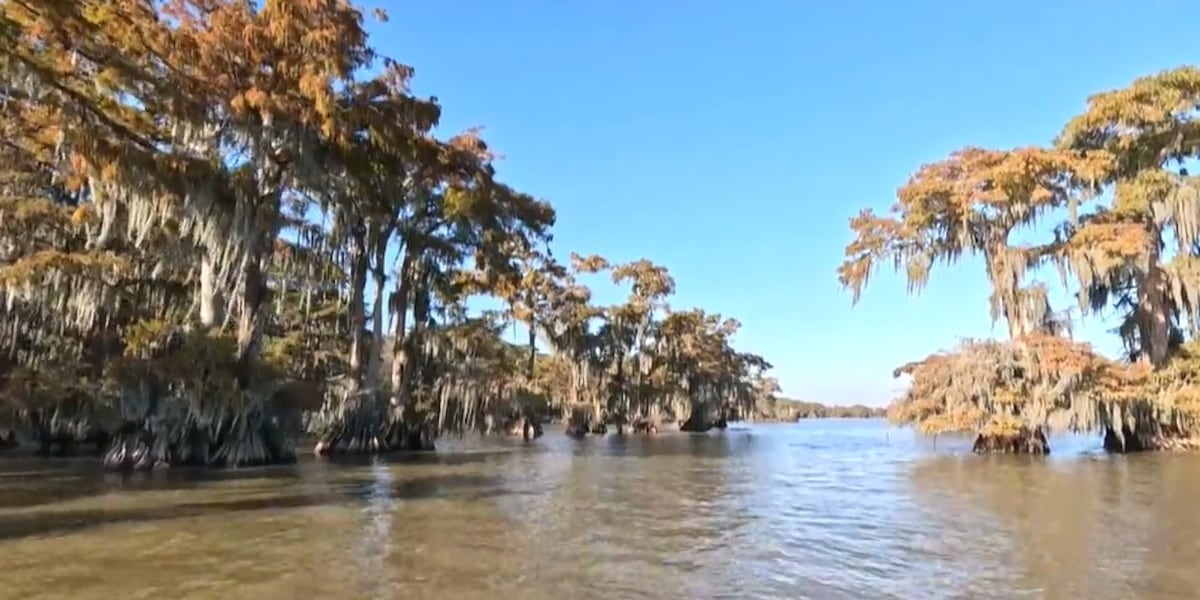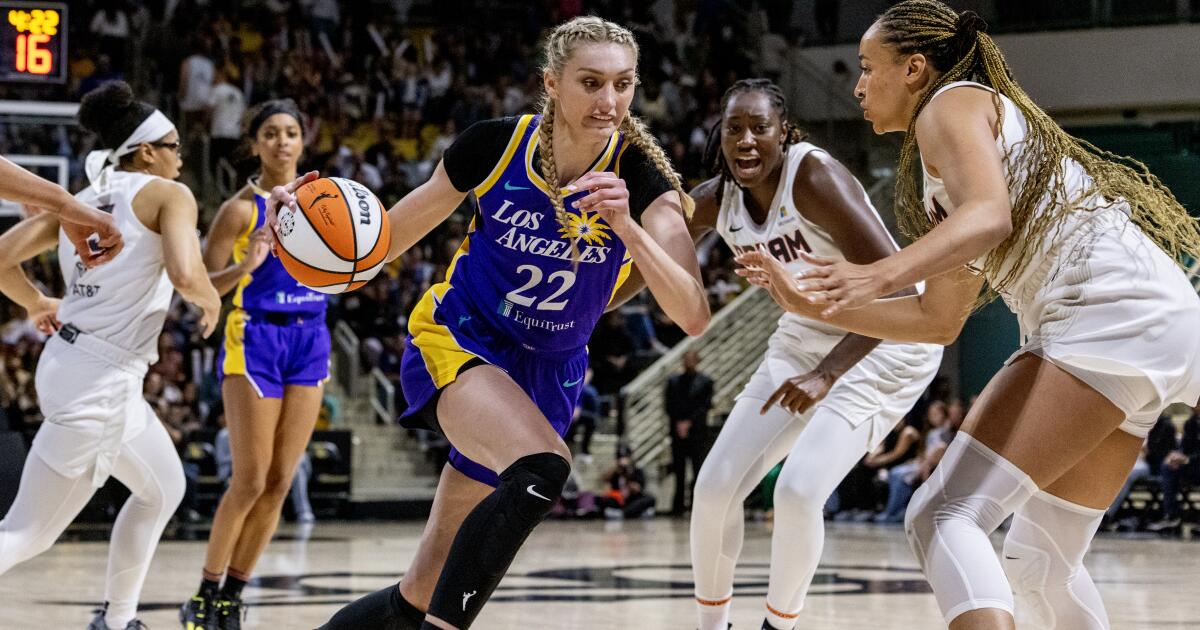Louisiana
Heart of Louisiana: Cammie Henry
/cloudfront-us-east-1.images.arcpublishing.com/gray/M4F4VDONFREEDOGDJSRLPTAY5A.jpg)
NATCHITOCHES, La. (WVUE) – She might have been a woman ahead of her time.
A century ago, Cammie Henry — the widowed owner of Louisiana’s Melrose Plantation — created a retreat for famous Southern writers and artists. And she preserved everything that was important to her in hundreds of scrapbooks. Dave McNamara shows us that remarkable collection in the Heart of Louisiana.
To read more, visit the Heart of Louisiana archive here.
See a spelling or grammar error in our story? Click Here to report it. Please include the headline.
Copyright 2023 WVUE. All rights reserved.

Louisiana
Louisiana Peach Festival expected to have huge economic impact in Ruston

RUSTON, La. (KNOE) – The 74th annual Louisiana Peach Festival is on June 1. It’s expected to bring in thousands of people from all over the region and have an economic impact of over $2 million for local businesses, restaurants and hotels.
For the first time ever, the Peach Festival will be free for all ages.
“It’s peach time, and we could not be more excited,” said Amy Stegall, main street director and community coordinator for the City of Ruston. “It’s our favorite time of year in Ruston and has been for over 74 years now. We’re super excited to offer it for free for the whole day and that’s our big news this year.”
The theme for the festival is, “Everyone’s invited,” which as Stegall says, is part of how the idea of having admission costs for free got started.
“We actually found in the Peach Festival catacombs an old banner that said, ‘Everyone’s invited to the Louisiana Peach Festival,’ and we thought, ‘What better year to bring that theme here when we’re going to offer the festival for free for the first time,’” said Stegall.
The festival includes live music, more than 100 food trucks and art vendors, kids’ activities, a parade, and of course, peaches.
RELATED CONTENT: 74th annual Louisiana Peach Festival to take place June 1
“You can come to the rodeo or play in the Pickleball tournament. You could also be a part of the pageants. There are lots of fun things happening in and around the festival property as well,” Stegall said.
Stegall said she hopes the economic impact will be felt by the entire community.
“We’ll see merchants in downtown have the biggest days of the year during the peach festival. Our hope is that if it’s free for the whole day, that impact will be felt even further, so restaurants, hotels and all of the things that happen. We want to see those dollars going to that local economy so we’re excited about that,” said Stegall.
Stegall explains why it’s important to keep the festival in town.
“It is something that is really important to our culture, and then when we come together in the community to spend our money in the community, it just multiplies in great ways for everybody,” Stegall said.
There are still slots available for those who wish to volunteer at the festival. If you are interested in signing up, click here.
Copyright 2024 KNOE. All rights reserved.
Louisiana
Court allows Louisiana to move forward with two majority-Black districts – SCOTUSblog
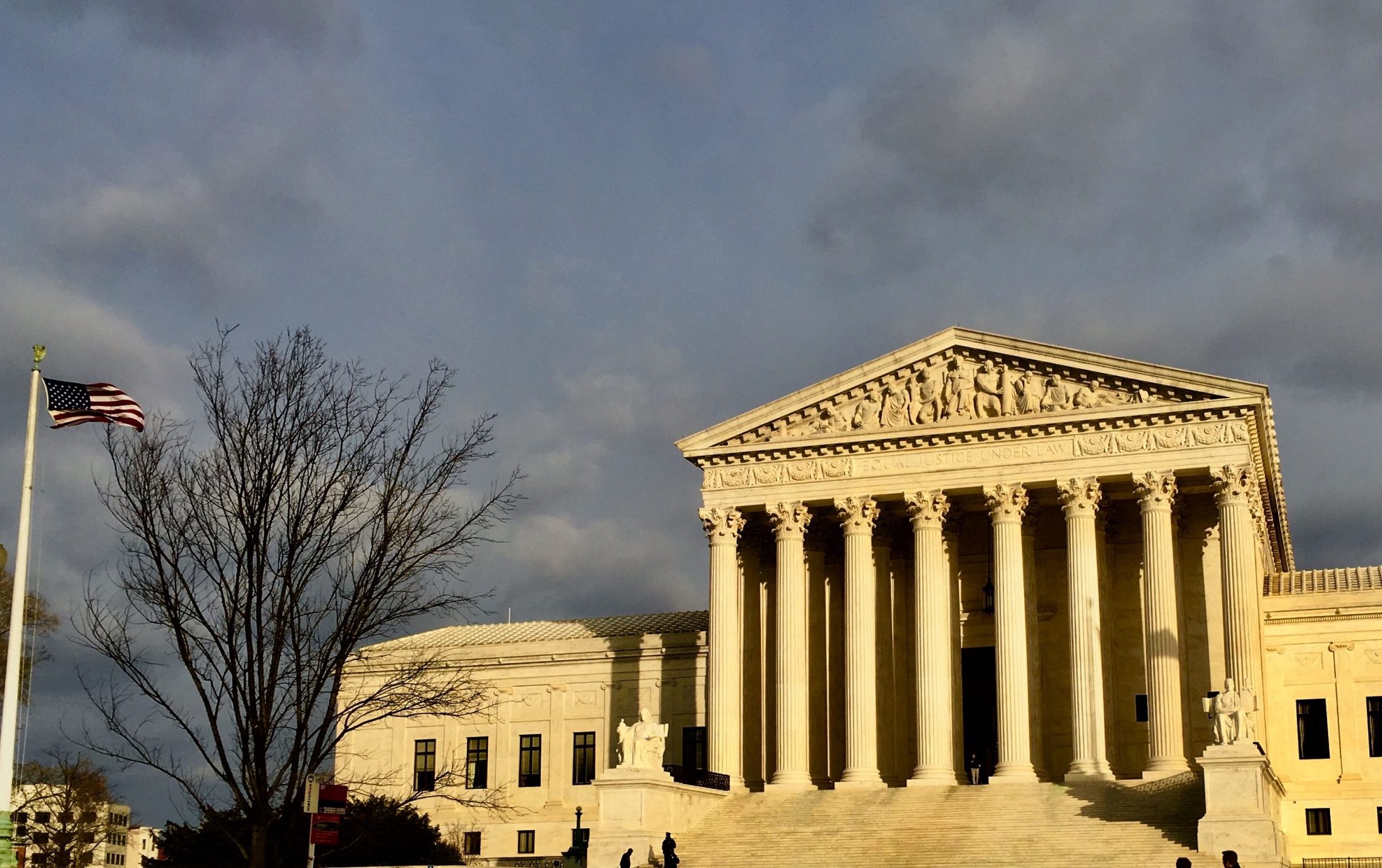
EMERGENCY DOCKET
on May 15, 2024
at 6:14 pm
The justices ruled on Louisiana’s voting map on Wednesday. (Guyyoung1966 via Wikimedia Commons)
The Supreme Court on Wednesday cleared the way for Louisiana to use a new congressional map, containing two majority-Black districts, in the 2024 elections. In a brief unsigned order the justices blocked a ruling by a federal court that had barred the state from using the new map on the ground that legislators had relied too heavily on race when they drew it earlier this year. The order cited an election doctrine known as the Purcell principle – the idea that courts should not change election rules during the period just before an election because of the confusion that it will cause for voters and the problems that doing so could cause for election officials. The lower court’s order will remain on hold, the court indicated, while an appeal to the Supreme Court moves forward.
Defending the 2024 map, the Louisiana secretary of state had emphasized that the legislature had created the map in the wake of a ruling by another federal court holding that an earlier map, which contained only one majority-Black district, violated the Voting Rights Act.
The court’s three liberal justices dissented from Wednesday’s order. Justices Sonia Sotomayor and Elena Kagan indicated only that they would have denied the requests to put the federal court’s ruling on hold. Justice Ketanji Brown Jackson dissented, explaining that in her view it is too early for Purcell to apply and there was no reason for the Supreme Court to intervene at this stage.
The dispute has its roots in a challenge by Black voters and civil rights groups to the congressional map that the Louisiana legislature drew for the 2022 elections. Although the 2020 census revealed that Black people made up approximately a third of the state’s population, in February 2022, the legislature adopted a plan, known as H.B.1, that created only one (out of six districts) majority-Black district, which stretched northwest from New Orleans to Baton Rouge.
U.S. District Judge Shelly Dick ruled that H.B.1 likely violated the federal Voting Rights Act. The U.S. Court of Appeals for the 5th Circuit rejected a request from the state officials and Republican legislators defending the maps to put the judge’s decision on hold, but the Supreme Court paused the case until it issued its decision in June of last year in a similar challenge to Alabama’s congressional map.
After the Supreme Court sent the case back to the lower courts, the 5th Circuit upheld Dick’s ruling that Louisiana likely violated the Voting Rights Act. The court of appeals gave the legislature until January 2024 to create a new plan.
In January, the legislature adopted – and Louisiana Governor Jeff Landry signed – a new map, known as S.B.8, that contained two majority-Black districts.
Nine days later, a group of 12 white voters went to a different federal court, where they argued that S.B.8 is an unconstitutional racial gerrymander – that is, it sorted voters based primarily on their race.
On April 30, a divided three-judge district court barred the state from using S.B.8 in future elections, holding that legislators had relied too heavily on race in drawing the map. Louisiana’s secretary of state indicated that May 15 would be the last day to adopt a new map for the 2024 elections, but the district court set a schedule that would lead to a new map by June 4.
Both Louisiana Secretary of State Nancy Landry (who is not related to Gov. Jeff Landry) and the Black voters and civil rights groups who had challenged H.B.1 came to the Supreme Court earlier this month, asking the justices to put on hold the district court’s order prohibiting the use of S.B.8, as well as the proceedings to come up with a new map.
Landry told the Supreme Court that race was not the primary factor behind the state’s decision to enact S.B.8. Instead, she wrote, the legislature was motivated by the court orders indicating that the state would likely violate the Voting Rights Act unless two of the six congressional districts were majority Black. Turning those rulings “back on the Legislature would be a wholly unfair game of gotcha that this Court has never endorsed.”
The H.B.1 challengers echoed Landry’s contention, calling the district court’s order barring the state from using the 2024 map an “aggressive incursion on state sovereignty” that leaves the state “trapped between the competing hazards of liability under the Voting Rights Act and the Equal Protection Clause,” which prohibits racial gerrymandering.
The legislature ultimately chose the 2024 map, Landry and the H.B.1 challengers contended, over other proposed versions because S.B.8 achieves the legislature’s political goals – specifically, protecting the districts of Speaker of the House Mike Johnson, Majority Leader Steve Scalise, and Rep. Julia Letlow at the expense of Rep. Garret Graves, who had supported Landry’s opponent.
Landry urged the justices to act by May 15, calling the dispute a “textbook case” for a stay of the lower court’s decision under the Purcell principle. “Even marginally moving that date,” Landry suggested, “will result in chaos down the line as other deadlines are blown and election officials struggle to complete their tasks within further compressed timelines.” Otherwise, Landry told the court, the only map that the state would be able to use “and still avoid election case” is the H.B.1 map.
The voters challenging S.B.8 countered that the district court’s ruling barring the state from using S.B.8 was a “simple and straightforward application of the law to the facts.” The state’s overriding goal in drawing the map was to create two majority-Black districts, they maintained, so that it could avoid additional litigation over H.B.1. The secretary of state’s insistence that the legislature drew the two majority-Black districts to comply with the court orders rings hollow, the S.B.8 challengers argued, because the district court never issued a final ruling on whether “the VRA actually required a second majority-Black district in the State — much less on whether District 6 stretching from the Northwest to Southeast corners of the State could remedy any alleged violation.”
The S.B.8 challengers also pushed back against the suggestion that there was any need for the Supreme Court to put the district court’s order on hold, much less do so quickly. The district court is already slated to issue a new map by June 4, they noted, and the May 15 deadline posited by the secretary of state, they say, “is simply an invention for this litigation”: Both the secretary of state and the state told the Supreme Court last year that the election could go forward as long as a map was in place by late May. Moreover, they added, “despite the State’s oddly shrill and last-minute warnings of chaos, this leaves ample time” to adopt a new map and take the necessary steps “before November’s primary.”
In its brief order, the majority cited the Purcell principle, signaling that it was putting the April 30 decision by the district court on hold because of the looming 2024 elections. But in her dissent, Jackson contended that “Purcell has no role to play here. There is little risk of voter confusion from a new map being imposed this far out from the November election,” she suggested. And she noted that the justices “have often denied stays of redistricting orders issued as close or closer to an election.”
“Rather than wading in now,” Jackson continued, she “would have let the District Court’s remedial process run its course before considering whether our emergency intervention was warranted.”
This article was originally published at Howe on the Court.
Louisiana
Federal Court Upholds Louisiana Felony Re-Enfranchisement Policy, But Allows Lawsuit To Continue
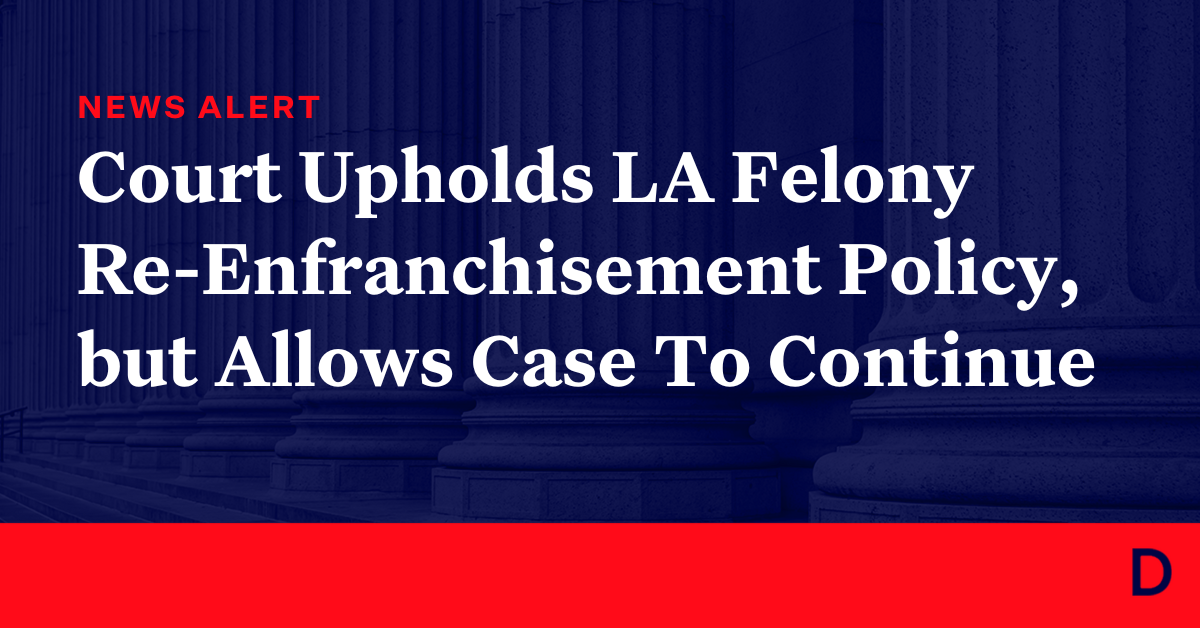
WASHINGTON, D.C. — Louisiana voters whose registrations were suspended due to a felony conviction must continue to provide extra documentary proof of eligibility to vote while a lawsuit challenging the policy continues, a court ruled.
On Monday, a federal judge determined that civil rights groups’ challenge of Louisiana’s policy for re-enfranchising “suspended citizens” has deficiencies. In light of these technical problems with the lawsuit, the court is allowing the plaintiffs to amend their complaint, and if they fix these issues, the lawsuit will be allowed to proceed.
In Louisiana, the right to vote is restored to someone who was incarcerated for a felony conviction after they have completed their sentence or once five years have passed since their incarceration. If the voter was not previously registered, they can register to vote like any other voter. However, if the individual was registered to vote prior to their conviction, they must present documentary proof of eligibility.
Last May, several voting rights groups filed a lawsuit challenging Louisiana’s voter registration policy for those with prior felony convictions. The lawsuit specifically challenges the state’s voter registration policy regarding “suspended” voters: citizens who were previously registered to vote and whose registration was suspended due to a felony conviction. “Louisiana has attempted to create a bifurcated process for accepting voter registration forms for people with convictions,” the complaint explains.
The plaintiffs argued that the state’s policy violated the National Voter Registration Act (NVRA) because the documentary proof of eligibility requirement for previously registered voters with prior felony convictions “exceeds the information necessary for election officials to assess an applicant’s eligibility, particularly given the guaranteed statutory access election officials have to the requisite information.” The court dismissed the plaintiffs’ NVRA claims, but allowed the plaintiffs’ other claims to proceed.
The plaintiffs also argue that the re-enfranchisement policy violates the Equal Protection Clause of the 14th Amendment because “suspended” voters with prior felony convictions attempting to register to vote are treated differently than new registrants with past convictions. This claim will move forward.
The plaintiffs also point out how this requirement is rooted in racist history writing: “the paperwork requirement for suspended voters is a part of a long history of erecting additional barriers for individuals with felony convictions to gain access to the franchise in Louisiana, a practice with Jim Crow-era origins.”
The court wrote that although the scheme subjects “thousands to a cat-and-mouse document chase” and “is a severe burden on one’s right to vote,” it will not be temporarily blocked due to problems with the plaintiffs’ claims. However, the lawsuit will proceed and the case is set to go to trial in January 2025.
This is not the first lawsuit to specifically target the intricacies of a state’s voter registration process for disparately impacting individuals with prior felony convictions. The League of Women Voters of Florida and the Florida State Conference of the NAACP filed a lawsuit challenging the state’s voter registration application, but it was subsequently dismissed.
Read the opinion here.
Learn more about the case here.
-

 News1 week ago
News1 week agoCompass Direct LLC’s 2024 Registration in North Carolina
-

 World1 week ago
World1 week agoTech compliance reports, Newsletter
-

 News1 week ago
News1 week agoMan, 75, confesses to killing wife in hospital because he couldn’t afford her care, court documents say
-

 News1 week ago
News1 week agoColumbia University cancels its main commencement ceremony after weeks of turmoil
-

 World1 week ago
World1 week agoPentagon chief confirms US pause on weapons shipment to Israel
-

 World1 week ago
World1 week agoConvicted MEP's expense claims must be published: EU court
-

 Politics1 week ago
Politics1 week agoPresidential polls show deadlocked race as party conventions quickly approach
-

 Politics1 week ago
Politics1 week agoRFK Jr said a worm ate part of his brain and died in his head




